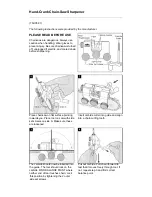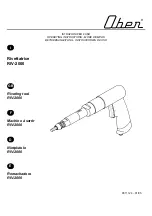
General Safety Information
Always wear safety glasses when using a grease gun. Keep work
area clean and remove any excess grease from tools, hands, and
clothing after use. Do not use grease gun whip hose for other
applications or at pressure levels above rated pressures.
WARNING - HIGH PRESSURE GREASE
NEVER allow contact of the output of the Grease Gun (coupler)
to a person's skin or body, injection of grease under the skin
could occur causing serious illness or death.
CAUTION
If left on floors, tools, or equipment, excess grease can cause
surfaces to become slippery.
Getting Ready to Use the Air Powered Grease Gun:
Air supply: You need dry air to operate this gun. Make sure an FRL
(Filter, Regulator, and Lubricator) unit is installed on your airline.
Moisture in the air will damage the grease gun. The compressor
you use must have a minimum volume of 1 CFM (0.026 cubic
meter). Inlet air supply should have a pressure between 40-120 PSI
(3–8 BAR). The recommended working pressure is 90 PSI (6 BAR).
This grease gun has a 40:1 pressure ratio; i.e. the grease discharge
pressure will be 40 times the inlet air pressure.
Lubrication: Like all air equipment, this grease gun needs regular
lubrication. To lubricate, add a few drops of oil through the air inlet
on the grease gun. It is recommended to use SAE 30 or greater oil.
Connecting the grease gun to air supply: There are several types
of quick connect couplers available in the market. This grease gun
comes with one standard male quick connect coupler. The coupler
must fit properly onto the female quick connect coupler on your
airline. If it does not fit properly, use a coupler that does.
Operating the grease gun trigger: This is a continuous action
grease gun, whereby there is continuous grease discharge with the
trigger pressed. Care must be taken not to over-lubricate due to
continuous action. Grease gun is capable of dispensing a full
14 oz. (400 gms) grease cartridge in 1 minute.
Setting Up the Grease Gun Head:
Attach the male quick connect coupler air fitting onto the air inlet on
the die cast handle. The male quick connect coupler air fitting has
1/4" NPT threads and should be threaded into the female hole on
the die cast handle using thread sealant. The connection should
be tight.
CAUTION
Grease or empty cartridge in barrel is under pressure from the
internal spring, use caution when removing either end of
the barrel.
Do not apply excessive torque or over-tighten the air fitting
as this will apply undue stress to the die cast outlet and may
cause it to fracture.
Preparing to Load Your Grease Gun:
1. Make sure the gun is disconnected from the air supply. Remove
any cartridge in the grease gun barrel prior to refilling. To check if
a cartridge is in the barrel first compress the spring by pulling the
plunger handle out to its maximum distance and lock it in place.
2. Remove the grease gun head by turning it counter clockwise.
3. Remove any empty cartridge.
There are 3 ways to load your grease gun: cartridge, bulk,
or filler pump. Always follow the steps listed above when
preparing to load your grease gun before proceeding to the
appropriate loading method.
Loading Grease Gun Cartridges:
1. Make sure the gun is disconnected from the air supply. Loosen
but do not remove the grease gun head from the grease gun
barrel by turning the grease gun head in a counter clockwise
direction 1-1/2 turns. Pull back and lock the plunger handle all
the way to the end of the barrel so the grease cartridge can
be fully inserted.
2. Now rotate the grease gun head in a counter clockwise direction
to unscrew the grease gun head from the barrel completely.
3. Remove the plastic cap from the grease cartridge and insert the
open end of the cartridge into the grease gun barrel until the rim
of the pull-tab end meets the rim of the grease gun barrel.
Now remove the pull-tab seal.
4. Screw the head of the gun onto the barrel, but do not fully
tighten the barrel. For now leave at least 2-3 turns before the
barrel is fully tightened against the gasket in the head.
5. Unlock the plunger rod handle from the end cap.
6. Move the plunger rod forward and backward to force out any
trapped air pockets from the grease. Air will escape from the
connection between the grease gun head and the barrel,
which is not fully tightened.
7. Reconnect the air supply and “prime” the system by pressing
the trigger until the grease starts coming out of the discharge
nozzle. Initial grease discharge may have trapped air. Once the
gun has been primed, fully tighten the grease gun head onto
the barrel.
8. Push the plunger rod into the barrel for easier manoeuvrability
during use.
9. You should now connect the grease gun extension and coupler
onto the grease gun outlet. The connection between the
extension and grease gun must be tight and it is advisable to
use a thread sealant to ensure a leak-proof joint.
www.jetequipment.com






















